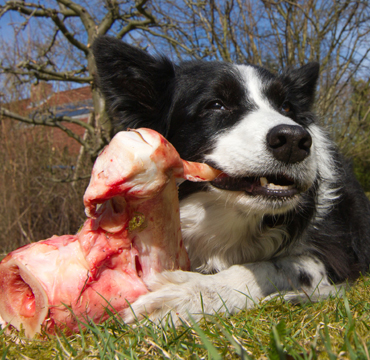|
As you might expect, the term ancestral diet is used to identify foods that resemble the kind of things our dogs' ancestors would have eaten and, alongside bio-appropriate, is one of the hottest marketing terms in the pet food industry right now.
 The idea of eating foods that your ancestors ate and that the body is, therefore, evolved to digest and utilise, is nothing new and has long been widely accepted as the healthiest way for us humans to eat. It has, however, only recently crossed over to the pet food industry and has led to a revolution in product formulation and marketing. The idea of eating foods that your ancestors ate and that the body is, therefore, evolved to digest and utilise, is nothing new and has long been widely accepted as the healthiest way for us humans to eat. It has, however, only recently crossed over to the pet food industry and has led to a revolution in product formulation and marketing.
But what is the ancestral diet of dogs? It is a question that can get dog owners quite fired up and the answer really depends on how far you go back...
For most manufacturers and dog owners, when they talk about the ancestral diet, the ancestors in question are grey wolves, prior to their domestication 20-30,000 years ago. This means that most foods labelled as 'ancestral' are very high in meat and very low or free from grains and should be lightly processed if not raw.
There is, however, increasing debate over how much modern dogs have evolved since their domestication and, therefore, how suitable this version of the ancestral diet is:
With an approximate generation time of 2 years, dogs have spent at least 10,000 generations living and eating with humans - primarily scavenging and picking up whatever scraps and cast offs they could get their paws on to. Naturally, this diet would have included far less meat and would have introduced the dog to grains and cooked foods. Add selective breeding into the mix which would have relentlessly favoured individuals that fared better on the new omnivorous diet and you have a strong case for the ancestral diet including more carbs and less meat and being at least partially cooked.
Although there is plenty of anecdotal evidence to support either interpretation of the ancestral diet, there is not yet any definitive proof of which one is truly most beneficial for dogs in general. The good news is, though, that from our experience, since both approaches revolve around feeding good, natural, whole foods and exclude all of the most problematic ingredients (wheat, added salts and sugars, chemical additives etc), they both usually work exceedingly well, even for the same dog, so it's not necessarily a case of either/or.
Unfortunately, as manufacturers cotton on to the appeal of the term, it is becoming more and more widespread and can already be found slapped on to all sorts of products that really don't resemble any definition of the ancestral diet so, as always, be sure to double check the ingredients list before taking the plunge.
|